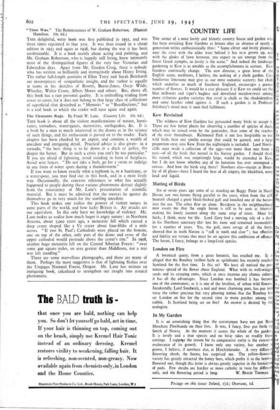COUNTRY LIFE
THE owner Of a most lovely and historic country house and garden who has been revisiting Kew Gardens at leisure after an absence of nearly a generation writes enthusiastically thus: "Some clever and lovely planning near the river with the older trees' behind it has ncw .grown up, and with the glades of lawn between, you expect to see'emerge from the forest Greek nymphs, so lovely is the scene." And indeed the landscape gardening at Kew is as notable as the accomplishments in science. Kew Gardens continually change. The new director, a great lover of the English scene, meditates, I believe, the making of a chalk garden. Car- boniferous limestone may give us our most romantic scenery; but chalk which underlies so much of Southern England, encourages a greater number of flowers. It would be a rare pleasure if at Kew we could see the blue milkwort and viper's bugloss and downland meadowsweet - among more elaborate garden varieties that revel in chalk as the rhododendron and some heather rebel against it. If such a garden is in Professor Salisbury's mind may it soon find fulfilment. THE owner Of a most lovely and historic country house and garden who has been revisiting Kew Gardens at leisure after an absence of nearly a generation writes enthusiastically thus: "Some clever and lovely planning near the river with the older trees' behind it has ncw .grown up, and with the glades of lawn between, you expect to see'emerge from the forest Greek nymphs, so lovely is the scene." And indeed the landscape gardening at Kew is as notable as the accomplishments in science. Kew Gardens continually change. The new director, a great lover of the English scene, meditates, I believe, the making of a chalk garden. Car- boniferous limestone may give us our most romantic scenery; but chalk which underlies so much of Southern England, encourages a greater number of flowers. It would be a rare pleasure if at Kew we could see the blue milkwort and viper's bugloss and downland meadowsweet - among more elaborate garden varieties that revel in chalk as the rhododendron and some heather rebel against it. If such a garden is in Professor Salisbury's mind may it soon find fulfilment.
Kew Revisited The wildness of Kew Gardens has persuaded many birds to accept it There are few better places for observing a number of species of duck, which may be joined even by the goosander, than some of the reaches of the river thereabouts. Richmond Park is not less hospitable to. our wild birds than any similar acreage that could be quoted, and a large proportion stray into Kew. Even the nightingale is included. Lord North- cliffe once made a collection of the eggs—not more than one from a nest—of all the birds that nested in his Surrey garden. I should think his record, which was surprisingly large, would be exceeded in Kew, but I do not know whether any of its botanists has ever attempted a census. And how the birds sing there! Nowhere else—except at Brom- ley of all places—have I heard the best of all singers, the blackbird, more loud and liquid.
Mating of Birds Six or seven years ago some of us standing on Baggy. Point in. North Devon saw two herons flying parallel to the coast, when from the cliff beneath charged a great black-backed gull and knocked one of the-herons into the sea. The other flew on alone. Residents in the neighbourhood now assure me that the single heron is still to be seen at. intervals making his lonely journey along the Same strip of -Coast. nisi big birds, I think, mate for life. Lord Grey had a moving tale of a duck in his Northern sanctuary that lost his mate and remained inconsolable for a number of .years. Yes, the gull, most savage of all the _ birds, showed that in truth Nature is "rat in tooth and claw " ; but affection and fidelity are virtues that must be set against this confession of offence. The heron, I fancy, belongs to a long.-lived species.
London on Fire A botanical query, from a great botanist, has reached me. It is alleged that the Rosebay (willow herb or epilobium) has recently reached Scotland for the first time. Is this so? We have all noticed the por- tentous spread of the flower about England. What with its well-winged seeds and its creeping roots, which at once increase any chance colanh it has all the advantages. Since London was bombed it has become one of the commonest, as it is one of the loveliest, of urban wild flowers. Incidentally, Lord Sandwich, a real and most charming poet, has put into verse the rather precious but very pleasing notion that the Rosebay lass set London on fire for the second time in many patches among the rubble. Is Scotland being set on fire? An answer is desired by the ecologist's.
In My Garden It is an astonishing thing that the nurserymen have not put Ross—i'l Moschata Floribunda on their lists: It was, I fancy, first put forth brAth Smith of Newry. At the moment it scents the whole of the garden. psi It is lovely and a true species and no briar takes so readily front it cuttings. I suppote the reason for its comparative rarity is the excessivesour exuberance of its growth. I know only one variety, but another • grown, I believe, if nowhere else, at Hinchinbrooke. A very differeo flowering shrub, the Senna, has surprised me. The yellow-flower variety has greatly attracted the honey bees, which prefer it to the browa-Ndriv flowered sort, though this latter is always greatly superior in the formatiompqi of pods. Few shrubs are hardier or more catholic in taste fqr differeollotte
Postage on this issue: Inland, lid.; Overseas, rd.


























 Previous page
Previous page